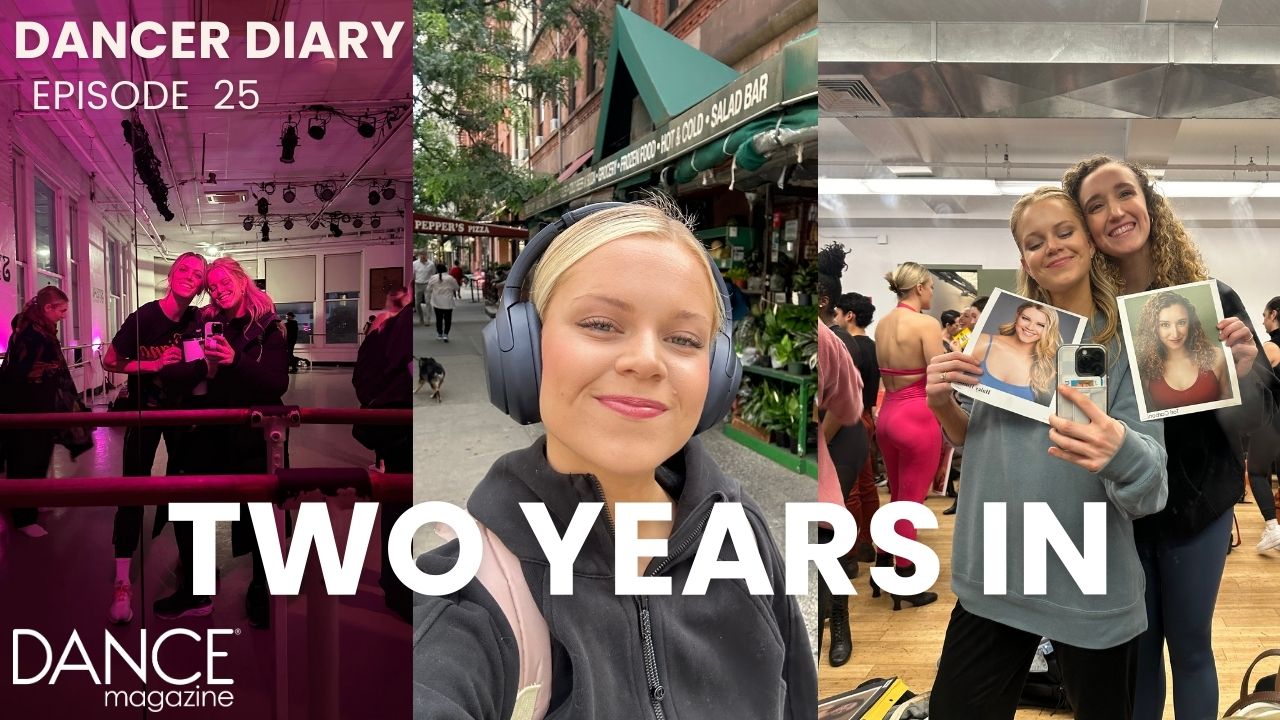Dancer Diary: Two Years In
It’s the two-year birthday of the Dancer Diary (formerly Begin Again) column! To celebrate such a momentous occasion, I’m answering a few questions sent by readers on social media. Thank you for taking the time to follow along on my journey back to professional dance after a chronic illness and pandemic shutdowns. It’s been a dream come true to share my experiences with you all, and I’m forever grateful for your support. Let’s dive in!
What kind of training and technique regimen did you have when you first started your journey back?
My medical history left me feeling fragile and anxious when I first returned to dance in 2021. I didn’t want to fry the engine, so I took things slow. I started with a couple months of at-home ballet classes on Instagram, before creating a CLI Studios account through which I took classes in a variety of styles, challenging my mind to remember how to pick up choreography. Over time, I began taking these virtual classes in larger spaces, where I could work on my technique, build strength, and increase my stamina. Once ready, I joined in-person classes at studios like Steps on Broadway and Broadway Dance Center. I built up from one in-person class per week to about four or five per week.
Outside of class, I worked with a physical therapist to both heal and prevent injuries. She recommended adding cross-training options like Pilates, walking, and bike riding to my weekly regimen. They’ve helped me build both strength and stamina!
Do you experience impostor syndrome, and, if so, how do you work through it?
Of course! I’d be concerned if someone took nine years off of dance and didn’t come back with some impostor syndrome. But, to echo Reneé Rapp’s viral video, I have chosen to lean into “delusion.” Someone is going to live their dance dreams—it might as well be me. I know the work I put into dance for 16 years before getting sick, I know the relationship I maintained with dance through teaching and writing for the following nine years, and I know how hard I’ve worked to return to dance post-illness. I believe in my talent. I believe I can connect with audiences through my work. If, for some reason, the hurdles prove to be insurmountable, I know that fixating on impostor syndrome won’t do me any good. What will happen will happen, so I may as well enjoy the ride.
What has been the most challenging part of your path back to dance?
I’ve been frustrated by my years of illness and the long-term impact it’s had on my current circumstances. Most of the dancers I’m auditioning with didn’t take significant time off and have resumés full to the brim with relevant professional experience. I mourn the loss of my early 20s and how they would have helped me thrive in this stage of my career.
Also, I’ve cried every time I’ve gone to an Equity chorus call as a nonunion performer. Those are not for the faint of heart.
What is your favorite part about being a dancer in New York City?
There is a moment just after a particularly good class ends when all the dancers crouch down and pound the floor with the palms of their hands. Everyone is sweaty and breathing hard after pouring their hearts out on the floor. The teacher beams at us with pride as we celebrate our bodies and the work we collectively put in to move our needles forward. The energy is electric. Whether the room is full of Rockettes, or American Ballet Theatre principals, or Ailey standouts, or Complexions company members, or Broadway legends, or dancers who are just getting started, everyone is chasing a dream. And everyone is rooting for the person crouched next to them on the floor.
I guess what I’m trying to say is that my favorite part about being a dancer in New York City is the generous and inspiring community I’m now a part of. Dancing with you is a dream come true.
What advice would you give to dancers who want to start their careers in New York City?
Go to class and build your community of dance friends. Serve and support when you can, and service and support will come back to you. Not only could those relationships open doors, but they will also make the hard days bearable and the good days that much better. Journal and celebrate all of your wins, and do your best to have fun—even when you’re nervous. Finally, try to remember why you started dancing in the first place, and look for experiences that support that joy. As long as you still love to dance, keep going!
For answers to more of your questions, check out my latest vlog over on Dance Magazine’s YouTube channel.




